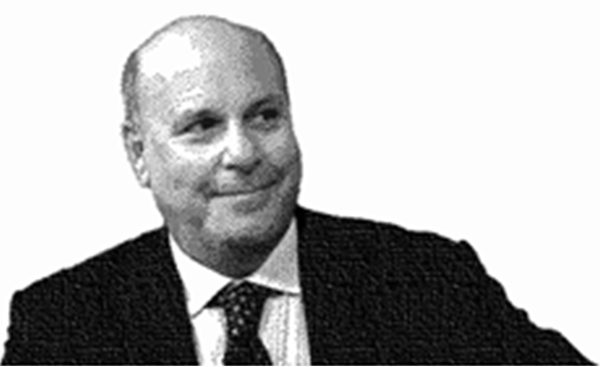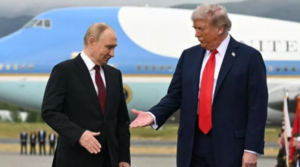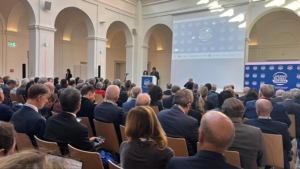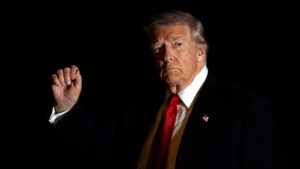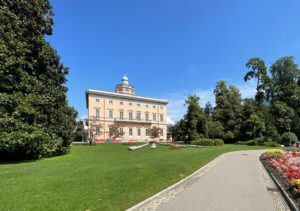Extract from This Is Not America (Biteback Publishing).
July 21th, 2017 – (…) I never liked the idea of the euro from Day One. I don’t like it much better right now. I think it actually complicates things. You have so much Brussels bureaucracy and so many different aspects, like taxation. When the idea of the euro first emerged I was not in love with it, and I don’t think I have come any closer to falling in love with it.
Donald Trump is talking down the euro. A moment later he will be talking down Angela Merkel, and then Barack Obama, and then Hillary Clinton. Then he will be talking up Brexit and Vladimir Putin. And then he will put in a plug for his newly refurbished golf course in Scotland. He’s just that sort of guy.
Trump is seated at a highly lacquered mahogany table in the lounge section of Trump Force One, a garishly equipped Boeing 757 that is parked in the cargo zone of tThe George Bush Intercontinental Airport in Houston. It is 17 June, 2016, three days after Trump’s 70th birthday, five days after the Pulse shooting in Orlando, and a little over twelve months since the brash billionaire famously rode down the escalator at Trump Tower to announce his campaign for the presidency.
Outside, on the sweltering tarmac, in the 99-degree heat of a June afternoon, the big plane is surrounded by a dozen fierce-looking, armour-plated grey Chevy Suburbans that are full of Secret Service types and a few jet- black Cadillac Escalades which are owned by Trump’s Texan donors.
The presumptive Republican nominee gestures for me to move his favourite red tie from the chair across from him, and for a moment I hold in my hands Donald Trump’s famous red tie, the signature Brioni red power tie that he likes to wear, along with his hand-tailored Brioni suit, as he jets around America, campaigning for the White House.
Trump has just flown in from a fundraiser in San Antonio, and he is preparing for another one here, in the wealthy suburbs of Houston. Only hours later he will fly to Phoenix and don his more incendiary public persona, leading thousands of supporters in an angry chant of ‘Build tThate Wall! Build thate Wall!’ at a campaign rally. But right now he is in his lair, safe and secure, relaxed, affable, even low-key. It is 17 June 2016, and he has just about wrapped up the Republican nomination.
The shock waves of the shooting massacre at the Pulse Club in Orlando are still reverberating across America, and Trump seizes the occasion to condemn ‘terrorism at a very disgusting level.’ He swears that if he is elected President he will wipe Isis ISIS and all ‘radical Islamic terrorism’ from the face of the earth. He does not say how he will do it. ‘Believe me,’ he repeats with a consummate salesman’s sincerity, ‘we will get the job done.’
Now Trump is hopping from subject to subject. Suddenly we are talking about his new golf course in Scotland. Later this week, Trump will fly to Scotland’s idyllic scenic west coast to cut the ribbon at the official opening in Ayreshire Ayrshire of the expensively revamped Trump Turnberry Resort and Golf Course.
‘I look forward to going to Scotland,’ says a grinning Trump.We have spent a great deal of money on renovating Turnberry, about £200 million, and we have done a fantastic job. It is magnificent. We have gutted out the building and we have rebuilt the course to the highest specifications. The ninth hole is moved out toward the ocean. It’s incredible. Now we hop back to America and I ask him about Barack Obama.
Trump does not blanch; indeed, he instantly pivots to his idea of what constitutes a more presidential, even-handed, stance. ‘Obama has been a very ineffective Ppresident. He refuses to use the term radical Islamic terrorism, which is a real problem because unless you are going to talk about it you are not going to solve the problem.’
Trump’s gaze wanders, and he breaks up the interview for some small talk and barks a few orders to an aide before jumping back into the conversation. Now Trump is back in Scotland, at the golf course.
‘I love Great Britain. My mother was born in Scotland, in StornawayStornoway, and I am sure we will have a great relationship with Great Britain.’
The Trump who is now speaking is the property developer and brand- name franchiser who will land in Scotland on the morning after the Brexit vote, triumphant. Trump would later predict that his White House victory would be ‘‘Brexit-plus.’. He was right again, and again he would be triumphant.
On that Boeing 757, back in June 2016, Donald Trump would talk with glowing admiration for of Vladimir Putin, and, when told that the Russian dictator had praised him at a conference in Saint St Petersburg just a day before, the Republican candidate for the White House would nearly blush. He would happily invite Putin to the White House, he declared, and the two would join forces to defeat Isis ISIS and bad guys everywhere.
On the plane that day, Trump looked like what he really was, a deal-making property tycoon from New York with more chutzpah than sophistication, a man with accomplished flair for embellishing and promoting his own brand, his personal fairy tale, his own version of the truth.
When we sat together that day in Texas, he was facing criticism for having stated his willingness to invite the mercurial North Korean leader Kim Jong- Un un to Washington for talks. The thought of two such impulsive types getting together and talking nuclear weapons was causing mingled panic and derision among the chattering classes who derive their worldview from the pages of tThe New York Times. But Trump had no time for the intellectuals and the East Coast eEstablishment who for decades had wrinkled their noses at his flamboyant antics.
‘I’ll talk to anybody,’ says the author of The Art of The Deal.
He is also clear about whom he likes and whom he doesn’t like –, until he changes his mind, of course, and that happens quite a lot. On this particular day he is happy to slam Germany’s Angela Merkel, whom he accuses of making a ‘massive mistake, a massive mistake’ by allowing migrants and refugees from the war in Syria into Germany. He is happy to explain why the euro was a failed experiment that never should have been started, and he is more than happy to talk about how the Clinton Foundation had taken many millions of dollars from countries that financeaccused of financing Islamic terrorism. Later on, after the campaign was over, there would be plenty of time to unbundle various promises and revise his positions. For now, Trump is in full-scale campaign mode, which, as one of his top advisers put it, was an experience unlike any other political campaign he had ever worked on.
‘He actually sits there at Trump Tower and asks us about his next appearance rather than his next campaign stop. He actually thinks about these as appearances, just like you would expect from a reality TV show star,’ confided this campaign adviser, one of several who would be fired during the course of the 2016 campaign. Not surprisingly, when it came time to pick his Cabinet, the world would watch a string of celebrity politicians show up at Trump Tower on Fifth Avenue and 56th Street and suddenly the selection of the gGovernment of the United States began to resemble an episode of The Apprentice. Trump even tweeted at one point that he and he alone knew who were the real ‘finalists’ for his Cabinet.
Throughout our conversation on board his private jet, Trump the soon-to-be President appeared cool and crisp. The private Donald Trump looks very much like a wealthy New York businessman with nouveau riche tastes who is about to dine on a luxury cheeseburger at the 21 Club. But he is also a conversation hopper, a schmoozer who is in love with the sound of his own voice, and a man who seems to find it hard to focus for more than a few minutes on any single issue. He appears to suffer from Attention Deficit Disorder. I remember thinking that his relatively brief attention span, like his outsized personality and the way he tends to filter much of the world through the prism of his own ego, are traits not at all dissimilar to those of other self-made billionaires and oligarchs I had met in my travels.
In some ways Trump reminded me of the subject of my last biography, an intimate portrait of another brash and successful narcissist billionaire, an Italian named Silvio Berlusconi. Like former Prime Minister Berlusconi, Trump has a certain repertoire of strongly -held opinions and slogans which he is prepared to express almost anywhere and everywhere, on a reality show or on the campaign trail or at the White House. Like Berlusconi, he repeats his strongly held views as though the repetition of declarative statements were in some manner a form of argumentation. Donald Trump does not do analysis. He does declarations. Yet, like Berlusconi, if he feels he is in the company of somebody he can trust – or somebody he wants to sell himself to – his manner becomes solicitous, courteous, even disarming, and the tone of his voice is always calming, always charming, as though this is the way brash billionaires from the Queens section area of New York are supposed to talk when they move to Fifth Avenue or get a four-year mandate to live at 1600 Pennsylvania Avenue.
I asked Trump right then and there on the plane if he saw any similarities between himself and Berlusconi. Trump did not seem flattered by the question; rather, he seemed somewhere between diffident and indifferent. ‘I guess,’ he replied after a bit of a pause, ‘we are both two rich guys who went into politics.’
Trump and Berlusconi would also go down in the histories of their respective countries as the political leaders with the greatest unresolved conflicts of interest in their nations’ histories.
In Berlusconi’s case, he claimed he never needed a blind trust or a special separation of his personal business and political interests because he had given his children control of his media company, Mediaset. In Trump’s case, he claimed he never needed a blind trust or a special separation of his business and political interests because he had given his children control of his company, tThe Trump Organization.
In fact, until the election of President Donald Trump in November 2016, no other major advanced industrial democracy had ever seen such an unprecedented concentration of business and political power in the hands of one man, except for Berlusconi, and under his leadership things did not go very well for Italy. Sure, there were plenty of banana republics in South America or in Africa where plutocrats took over governments, or enriched themselves even as they governed. But this was America, and surely such things could never happen here, here in the USA! (…)

